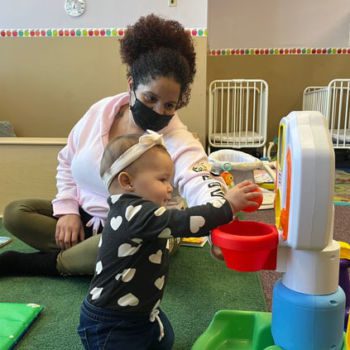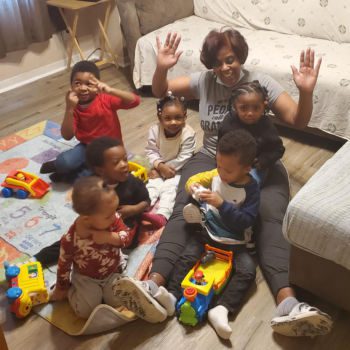
March 6, 2023 Community Stories
Early Educators Chart a Path from Self-Care and Cultural Responsiveness To Professional Growth
Karen Reuter, deputy director at the Collaborative for Educational Services, remembers the moment when she knew its trainings for early childhood educators were taking hold.
One of the workshop participants stopped themselves in a peer presentation to say, “Oh, wait. I have to breathe right now.”
Trivial? Hardly.

According to Reuter, self-care for educators is vital. It boosts the self-awareness necessary to support our youngest learners and to identify and remove learning barriers including those by racism for young children of color.
“In order to be open to the needs of our littlest people and not misread the cues they provide, you have to be present. You can’t be overstressed or overtaxed yourself, and you have to value your well-being first,” she explained.
Reuter points out that early childhood teachers typically toil in an industry with low pay and little or no professional development opportunities. And the pandemic worsened their sense of isolation.
To respond to the problem — and with grant support from the Community Foundation in hand— the Northampton-based Collaborative provided an institute for early educators from Hampden, Hampshire and Franklin counties. The institute began with professional development sessions on early childhood best practices. Thereafter, educators from six area community-based programs were invited to participate in a six-month intensive professional development experience. They received individualized coaching in small teams at their respective centers, participated in facilitated professional learning community discussions, and received stipends for their time and to for the purchase of materials to allow them to implement new practices.
The program, designed by the Collaborative’s early childhood director, Desirée Lalbeharie, guided educators in exercises to reflect on their own self-care, on implicit biases, and in the development of strategies for change. The ultimate goal was to have educators to feel supported and valued — and for their programs to be more culturally responsive to its children and families.
“We have a responsibility to help people understand the barriers our littlest learners encounter and how to take the barriers apart…This project was designed to sort of ‘wrap arms’ around early educators and engage them in a growth process that meets them where they’re at in a non-judgmental way.”

At the final meeting, Reuter marveled at the extraordinary connection the child program leaders had developed amongst one another. After working in teams to create program improvements, hold each other accountable, and develop action plans, the sense of care, collegiality, and camaraderie was clear.
“It was powerful,” Reuter said. “There wasn’t a dry eye in the house.”
The Collaborative is closing in on its 50th year providing direct and educational support services— steeped in social justice and equity — to its 37-member school districts and to various state and district-level clients across New England.
While the Collaborative will grow and refine its professional development offerings, Reuter dreams of a community of early education practitioners who build a network of peer mentoring that sustains itself well into the future. “There’s a hope that a team that goes through our training will then train someone new in their childcare center or another center and another. The idea is that this program will have a lasting impact.”

